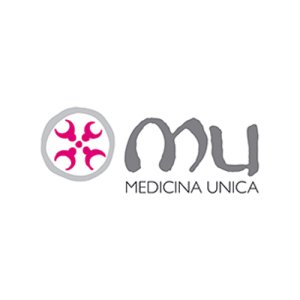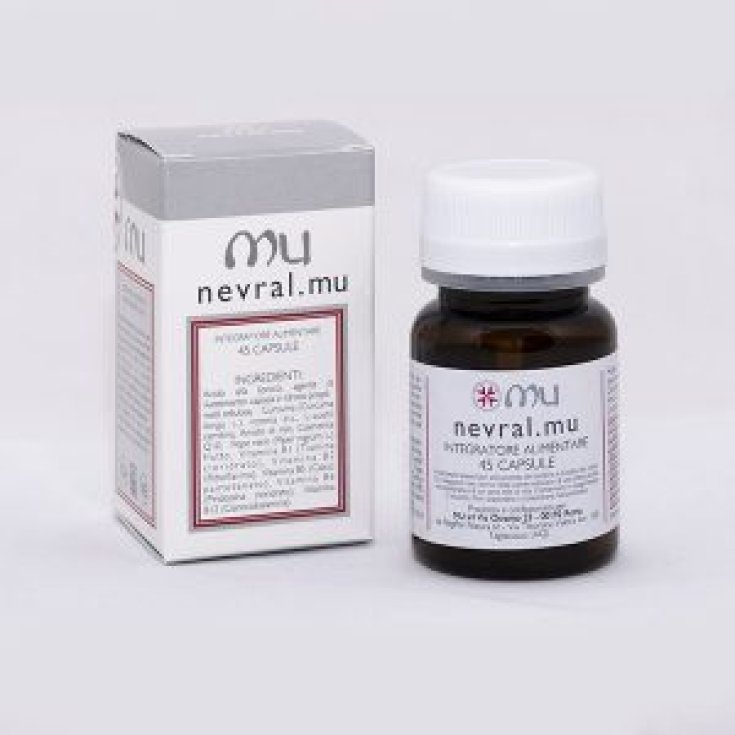MU Nevral Mu Food Supplement 45 Capsules

- Brand: MU Srl
- Product Code: 976863961
- EAN:
- Availability: In Stock
- Purchase 3 items for 33.52€ each
- Purchase 4 items for 32.83€ each
- Purchase 5 items for 32.15€ each
MU
neral.mu
Dietary supplement
CENTRAL AND PERIPHERAL NEUROPATHIES
MOTOR SENSITIVE FUNCTION
OF THE PERIPHERAL NERVES
Thanks to its components, nevral.mu has an important role in improving the reparative processes in central and peripheral neuropathies and in muscle trophism; it enhances the conductivity and stability of the neuronal membrane and improves the sensory-motor function of the peripheral nerves. Nevral.mu is a valid help in paresthetic, inflammatory, circulatory, neurodegenerative pathologies and, thanks to the association of the polyvitaminic group, it guarantees an adequate energy supply.
COMPOSITION
The daily dose of 1500 mg, equal to 3 gastro-resistant capsules, contains:
Alpha Lipoic Acid 600 mg
Curcuma longa (turmeric) - eg 240 mg
L-acetyl carnitine 234 mg
Coenzyme Q10 30 mg
Piper nigrum (black pepper) - e.g. 15 mg
Vitamin B1 2.36 mg (215% NRV)
Vitamin B2 3.00 mg (214% NRV)
Vitamin B5 11.00 mg (183% NRV)
Vitamin B6 2.47 mg (176% NRV)
Vitamin B12 54 mcg (2160% NRV)
NRV *: reference nutritional value for adults.
METHOD OF USE
Three capsules a day.
OWNERSHIP OF COMPONENTS
Alpha-lipoic acid:
Alpha-lipoic acid (ALA) is a fatty acid with a powerful antioxidant action that helps fight the oxidative stress caused by free radicals both outside and inside the nerve cell, including the membranes of the mitochondria, where resources are located. energy and self-repair of the nerve. Furthermore, ALA can recycle and regenerate the natural water-soluble antioxidants (such as vitamin E and coenzyme Q), amplifying their effects. In this way it protects nerves and blood vessels from ROS attacks, favoring the well-being of nerve fibers and carrying out a general anti-aging action on them, with the result of making them more efficient in the transmission of nerve impulses, essential for neuro-conduction. muscular.
Curcuma longa:
Turmeric is attributed a powerful antioxidant activity, in particular turmenol a and b prevents the self-oxidation of linoleic acid, a fatty acid which is part of the cell membrane structure. The anti-inflammatory activity has been highlighted in both acute and chronic inflammations. The protective effect on the liver of the titrated dry extract of turmeric was studied on rats receiving carbon tetrachloride as a hepatotoxic substance. This plant has been shown to greatly reduce the increase in bilirubin, transaminase, alkaline phosphatase and cholesterol levels caused by carbon tetrachloride, especially when given for 2 weeks prior to the toxic and then concurrently with it.
L-acetylcarnitine:
To combat the pain associated with peripheral neuropathies and intervene on causes and symptoms, neurologists increasingly rely on the role of L-acetylcarnitine (LAC) in light of the specificity of its dual neurotrophic and pain-relieving mechanism of action. LAC acts on the transmission of the neurotransmitter glutamate, reducing its elimination and consequently lowering the impact on the synapses that transmit pain. ACL is also important for the treatment of chronic pain, in fact its analgesic action continues for over a month after the suspension of therapy. It therefore allows to have long-lasting effects, also obtaining a more effective prevention of relapses in a pathology that includes different types of pain, for example inflammatory pain, such as in arthritis, or neuropathic pain, caused by damage to nerve fibers.
Coenzyme Q10:
The antioxidant function of Coenzyme Q10 is effective in controlling the peroxidation of membrane lipids and atherogenic LDL cholesterol particles. It is therefore used in the prevention and management of neurodegenerative diseases, in the prevention of cellular aging and in the prophylaxis of heart disease, hypertension and associated damage. Oxidative damage seems to be one of the main protagonists of neurodegenerative diseases. The damaging action of oxygen free radicals on nervous structures represents a pathogenetic mechanism typical of diseases such as Parkinson's and muscular dystrophy. From first experimental studies, the appropriate integration with Coenzyme Q10 can block the biological mechanisms involved in the development and progression of the disease, offering an intervention and prevention tool complementary to classic pharmacological therapies.
Piper nigrum (black pepper):
Black pepper is among the remedies of Ayurvedic medicine and is one of the three spices that make up the "Trikatu" (together with saffron and long pepper) used to promote digestion and stimulate the metabolism. Piperine, the alkaloid contained in pepper, makes the spice stimulating, tonic and stomachic and, by stimulating the secretion of gastric juices, facilitates the digestive process and facilitates the absorption of nutrients, deriving the maximum benefit from the ingested food. An effect of black pepper is also to stimulate thermogenesis, which is why it is considered an excellent adjuvant in slimming diets and to fight obesity.
Vitamin B1:
Vitamin B1 performs numerous functions for maintaining the correct processes of the organism, first of all by providing energy. It is in fact essential for the transformation of glucose, making it immediately available to the organs, muscles and nervous system. It also contributes to the well-being of the cardiovascular system, to the formation of red blood cells and is often called the "vitamin of morale", as it promotes mental balance.
Vitamin B2:
The main functions of vitamin B2 are to promote the energetic use of macronutrients taken with food, the preservation of the integrity of the nervous system, skin and eyes. Like vitamin B1, vitamin B2 plays a fundamental role in the synthesis of all energy processes. Its peculiarity is therefore to release the right energy to the body for carrying out regular daily activities. One of the most interesting aspects of riboflavin is its protective role, together with an enzyme called glutathione reductase, against free radicals. Vitamin B2 also works as an antioxidant that captures and destroys abnormal cells in the body, such as cancerous ones.
Vitamin B5:
Vitamin B5, or pantothenic acid, plays a fundamental role in the metabolism of fats, proteins and carbohydrates and is involved in the synthesis of cholesterol and hormones. Vitamin B5, in particular, is indicated for the protection of hair and skin, to prevent states of fatigue and for the healing of wounds and burns. It is also used to slow down the aging process and because, on average, it prolongs the life of cells.
Vitamin B6:
Vitamin B6 is necessary for the synthesis of the neurotransmitters of serotonin and norepinephrine for the formation of myelin, a structure capable of protecting the CNS. It acts as a tranquilizer and relieves nervous and muscular disorders, reduces blood pressure, delays cellular aging.
Vitamin B12:
Vitamin B12 is known as the "energizing vitamin", ideal for people who are deficient, stressed, tired or convalescing. It is known for its positive effects on disorders of the nervous system and the brain. It improves the chronic fatigue syndrome and the symptoms of neuropathies caused by diabetes. It also assists in the production of DNA.
CONTRAINDICATIONS AND SIDE EFFECTS
At the recommended doses, no undesirable effects are known.
PHARMACEUTICAL FORM
Bottle of 45 capsules of 500 mg each.

